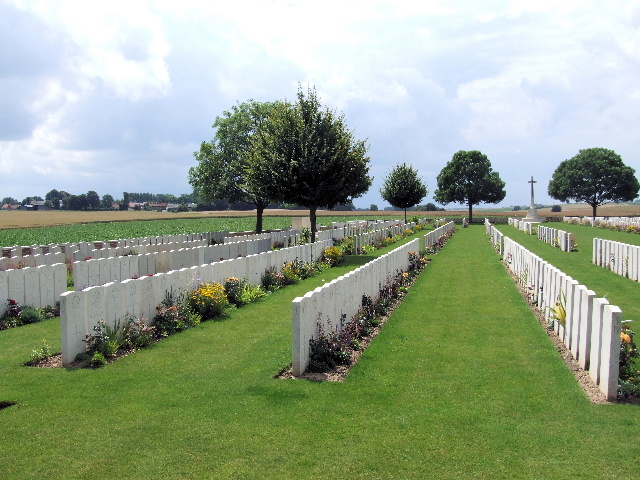Name
Sidney Charles Dawe (MC)
11 Dec 1897
Conflict
First World War
Date of Death / Age
13/02/1918
20
Rank, Service Number & Service Details
Captain
Lincolnshire Regiment
5th Bn. attd. 1st Bn.
Awards: Service Medals/Honour Awards
Searched but not found
Military Cross
Cemetery/Memorial: Name/Reference/Country
FINS NEW BRITISH CEMETERY, SOREL-LE-GRAND
IV. B. 10.
France
Headstone Inscription
PROMOTED TO HIGHER SERVICE
UK & Other Memorials
Tring Town Memorial, St Peter & St Paul Church Roll of Honour, Tring, Berkhamsted Collegiate School Memorial, Berkhamsted, Not on the Berkhamsted memorials
Pre War
Sidney Charles Dawe was born on 11 Dec 1897 in Tring, Herts, (baptised on 17 Apr 1898 in Tring ) to Arthur Henry Dawe and Elizabeth (nee Chappell). He was one of nine children, although one had died in infancy.
On the 1901 Census the family of parents, Arthur James (born 1892), Evelyn (born 1894), Winifred (born 1896), Sidney and Bessie Marjorie (born & died 1901) were living at 51-52 High Street, Tring where his father was an ironmonger. The family of parents, Arthur J, Winifred, Harold Thomas, Sidney, Nancy Elizabeth (born 1905), Douglas Gordon (born 1907) and Robert (born 1908) remained there in 1911 at which time Sidney was a scholar. He was educated at Berkhamsted School, leaving in 1914.
Wartime Service
Sidney joined as a Territorial Soldier London Regiment in the 1/28 (County of London) Battalion (Artists Rifles) in May 1915 when he was aged 17. He was commissioned into the Lincolnshire Regiment as a 2nd Lieutenant in the 1st Battalion in Oct 1915. He was sent to France in Nov that year but returned for further training in Nov 1916, later returning to the Front.
On 31 Mar 1917 he was involved in an action at the Croiselles-Henin Road, south of Arras, France when the enemy attempted to drive the Lincolnshires out by a bombing attack. Sidney, though wounded in the wrist, remained for two and a half hours at the forward post, and by the energetic use of his Lewis gun, drove off the Germans, who had a machine-gun with them. Two 1st Lincolnshire officers and fourteen other ranks were wounded in the attack. Sidney was awarded the Military Cross for his gallantry. General Haig in his dispatches, stated "He led his platoon in the most gallant manner and inflicted heavy casualties on the enemy. Later, although wounded, he remained at his post until the position was consolidated."
He was killed accidentally on 13 February 1918, aged 20. The inquiry into his death recorded that he was found dead on the rifle range and it was presumed he met his death by accident. He is buried in Fins New British Cemetery, Sorel-le-Grand, France.
In a letter to his parents his Colonel wrote "I have only recently known your son, but in that short time, I have formed a high opinion of his abilities, his reputation in the battalion, as an Officer, stood high and I was told that the award of his Military Cross was one of the finest ever won in the Battalion. I think you will understand what that means. Your son was very popular with everyone, and was a most capable officer, extremely gallant, and absolutely dependable. Personally, I know that I have lost one of my best company commanders, and, on behalf of myself and the whole battalion, I want you to accept this expression of our deepest regret. You have the consolation of knowing in what regard he was held by his brother officers, how well he did his duty and how splendidly he maintained the traditions of the regiment. We buried him this afternoon with full military honours in a cemetery about three miles from here. All officers and men of the battalion, who were not on duty, attended the funeral."
Additional Information
Probate of his estate was granted to his father on 28 Jun 1818 in London with effects of £164 2s 3d. who also received a war gratuity of £5 and pay owing of £141 11s 3d. Strangely his medal card shows no medals, even though he would have been eligible for the 1915 Star, British War Medal and Victory Medal, and he was awarded the Military Cross for gallantry. N.B. Although at registration the spelling of the name Sidney is with an 'i', some of the military records use the letter 'y' i.e. Sydney.
Brother Arthur James was commissioned as Sub-Lieutenant RNVR serving from Aug 1915 in the Royal Naval Division until medically discharged 11 Mar 1918. Brother Harold Thomas served in France from 22 Jul 1915 as Private 13427 in 6th Battalion, Ox & Bucks Light Infantry, He was later commissioned as 2 Lt in Machine Gun Corps, survived the Great War.
Acknowledgments
Brenda Palmer, Neil Cooper
Jonty Wild, tringlocalhistory.org.uk



